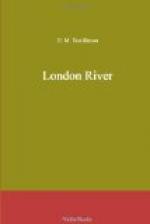I have been told that London east of the Tower has no history worth mentioning, and it is true that sixteenth-century prints show the town to finish just where the Dock of St. Katherine is now. Beyond that, and only marshes show, with Stebonhithe Church and a few other signs to mark recognizable country. On the south side the marshes were very extensive, stretching from the River inland for a considerable distance. The north shore was fen also, but a little above the tides was a low eminence, a clay and gravel cliff, that sea-wall which now begins below the Albert Dock and continues round the East Anglian seaboard. Once it serpentined as far as the upper Pool, disappearing as the wharves and docks were built to accommodate London’s increasing commerce. There is no doubt, then, that the Lower Thames parishes are really young; but, when we are reminded that they have no history worth mentioning, it may be understood that the historian is simply not interested enough to mention it.
So far as age goes my shipping parish cannot compare with a cathedral city; but antiquity is not the same as richness of experience. One remembers the historic and venerable tortoise. He is old enough, compared with us. But he has had nothing so varied and lively as the least of us can show. Most of his reputed three hundred years is sleep, no doubt, and the rest vegetables. In the experience of Wapping, Poplar, Rotherhithe, Limehouse, and Deptford, when they really came to life, there was precious little sleep, and no vegetables worth mentioning. They were quick and lusty. There they stood, long knee-deep and busy among their fleets, sometimes rising to cheer when a greater adventure was sailing or returning, some expedition that was off to find further avenues through the Orient or the Americas, or else a broken craft bringing back tragedy from the Arctic; ship after ship; great captain after great captain. No history worth mentioning! There are Londoners who cannot taste the salt. Yet, no doubt, it is difficult for younger London to get the ocean within its horizon. The memory of the Oberon, that famous ship, is significant to me, for she has gone, with all her fleet, and some say she took Poplar’s best with her. Once we were a famous shipping parish. Now we are but part of the East End of London. The steamers have changed us. The tides do not rise high enough today, and our shallow waters cannot make home for the new keels.




